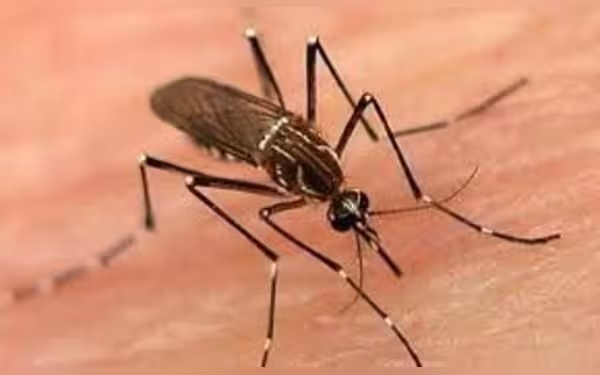Friday, October 4, 2024 05:30 AM
Dengue Outbreak Threatens Khyber Pakhtunkhwa as Cases Surge
- Khyber Pakhtunkhwa reports 904 confirmed dengue cases.
- Peshawar experiences the highest incidence of dengue.
- Health officials urge preventive measures against mosquito breeding.
 Image Credits: dawn
Image Credits: dawnKhyber Pakhtunkhwa faces a dengue outbreak with 904 confirmed cases, urging health officials to implement preventive measures.
PESHAWAR: The province of Khyber Pakhtunkhwa is currently facing a significant threat of a dengue outbreak, as health officials report a concerning rise in cases. This year alone, the number of confirmed dengue infections has reached 904, with 53 new cases reported recently. The situation is particularly alarming in Peshawar, where 244 cases have been documented, marking it as the area with the highest incidence of the disease in the province.
Health authorities are deeply worried about the potential for violent outbreaks, reminiscent of the severe dengue crisis in 2017, which saw 20,000 cases and 60 fatalities. In September of this year, Peshawar alone recorded 192 cases, primarily from neighborhoods that were previously affected during the 2017 outbreak. Currently, 17 dengue patients are hospitalized, but many individuals are opting for treatment at local clinics run by unqualified practitioners, which complicates the situation further.
Of the total 904 confirmed cases, a staggering 761 were diagnosed just in September. Presently, there are 357 active cases in the province, while 547 patients have successfully recovered and been discharged from hospitals. Although only two deaths have been reported so far, health officials emphasize the importance of protecting vulnerable populations, particularly the elderly and those with pre-existing health conditions, by advising them to remain indoors during the evening hours when mosquitoes are most active.
In addition to Peshawar, other districts such as Abbottabad, Hangu, Mansehra, and Nowshera are also experiencing a surge in dengue cases, with reported infections of 114, 93, 80, and 79, respectively. The disease is now widespread across 25 districts, largely due to the recent rains that have created stagnant water pools, which serve as prime breeding grounds for mosquitoes.
The health department is actively screening, testing, and treating individuals for dengue; however, the ongoing issue of mosquito breeding persists. Many residents are forced to store water in uncovered containers due to frequent power outages, which further exacerbates the problem. Despite the government's annual Dengue Action Plan aimed at coordinating efforts among various departments, the lack of a reliable water supply has left residents with no choice but to store water, inadvertently contributing to the mosquito population.
Moreover, the role of local municipal committees in managing standing water is crucial, yet their efforts have not been sufficient to curb mosquito breeding. The dengue virus remains a significant threat, with numerous areas in Peshawar reporting cases. Authorities are conducting insecticide spraying and organizing public awareness campaigns, but the effectiveness of these measures is hindered by ongoing power breakdowns.
In light of these challenges, health officials stress that escaping mosquitoes is nearly impossible under the current circumstances. They urge the government to implement the Dengue Action Plan for 2024 effectively, before the situation escalates into a full-blown health crisis. It is imperative for the community to remain vigilant and proactive in taking preventive measures against dengue, as the health and safety of the population depend on collective efforts to combat this mosquito-borne disease.













